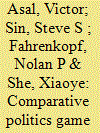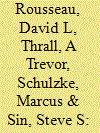| Srl | Item |
| 1 |
ID:
134574


|
|
|
|
|
| Summary/Abstract |
Undergraduates often struggle with theoretical perspectives in political science. Often students can get a better handle on theories if they are able to relate them to something tangible in their experience. Lichbach and Zuckerman lay out cultural, rational actor, and structural perspectives as a way to think more systematically about comparative politics but often students struggle with these meta-theories and the different ways they encourage us to think theoretically about comparative politics. In this paper, we discuss a set of exercises that enable students to get a better handle on cultural, rational actor, and structural perspectives on comparative politics by making them “lab rats in their own experiments.” We group these exercises together and treat them as a Comparative Politics Game Show. In this paper, we describe the different exercises and how they were used and our view of the utility of this approach for teaching comparative politics theory.
|
|
|
|
|
|
|
|
|
|
|
|
|
|
|
|
| 2 |
ID:
114155


|
|
|
|
|
| Publication |
2012.
|
| Summary/Abstract |
Despite strong empirical evidence for democratic peace theory, the historical record indicates that democracies have been involved in many wars. This article conducts a critical examination of how democratic polities become entangled in international conflict. The examination focuses on how democratic leaders manage domestic politics and public opinion at each stage of the conflict (i.e. disputes, crises, wars and settlement). The study explores how democracies are drawn into conflict; when democracies provoke conflict; what claims democratic leaders make to justify conflict; when domestic audiences support or oppose conflict; and the implications for democratic leaders after conflicts. It argues that democratic leaders pursue various strategies that are shaped by the stage of the conflict, the domestic institutional structure and the level of mobilised domestic opposition.
|
|
|
|
|
|
|
|
|
|
|
|
|
|
|
|